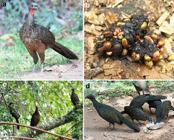Abstract
Frugivorous birds are important seed dispersers and influence the recruitment of many plant species in the rainforest. The efficiency of this dispersal generally depends on environment quality, bird species, richness and diversity of resources, and low levels of anthropogenic disturbance. In this study, we compared the sighting number of dusky-legged guans (Penelope obscura) by km and their movement in two areas of Serra do Japi, one around the administrative base (Base) where birds received anthropogenic food and a pristine area (DAE) with no anthropogenic resource. We also compared the richness of native seeds in feces of birds living in these two areas. Although the abundance of P. obscura was higher in the Base, these individuals moved less, dispersed 80% fewer species of plants and consumed 30% fewer seeds than individuals from DAE. The rarefaction indicated a low richness in the frugivorous diet of birds from the Base when compared to the populations from DAE. We conclude that human food supply can interfere in the behavior of these birds and in the richness of native seeds dispersed.
Keywords:
behavior; conservation; frugivory; ecological impacts; Serra do Japi

 Thumbnail
Thumbnail
 Thumbnail
Thumbnail
 Thumbnail
Thumbnail


